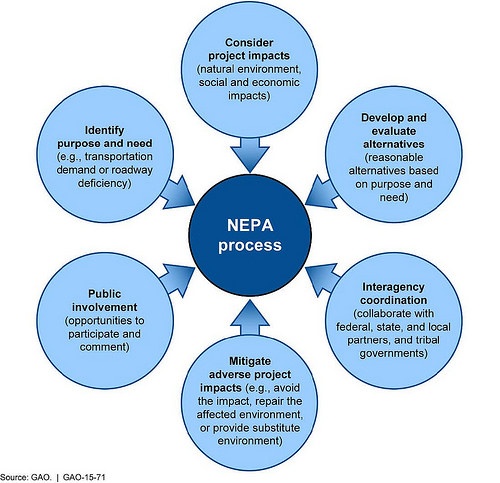In the last week before President Obama left office, the Environmental Protection Agency (EPA) completed a multi-year review of its Accidental Release Prevention (ARP) program for toxic catastrophe prevention, and adopted significant expansions of ARP requirements (I wrote about them here). EPA proposed ARP revisions in March 2016 (I blogged about them here). Then, when President Trump took office, EPA reversed course, repeatedly deferring the effective date of those revisions while the agency reviewed them. In May 2018 EPA completed its review, and published a proposal in the Federal Register to rescind almost all these expansions and return ARP requirement to those in place before 2017. EPA also included an alternative proposal that retained a few more elements, and requested public comment on both versions no later than July 30, 2018.
Read MoreAudit, Compliance and Risk Blog
Jon Elliott
Recent Posts
EPA Proposes to Rescind Last Administration’s Long-Delayed Accidental Release Prevention Revisions
Posted by Jon Elliott on Tue, Jul 17, 2018
Tags: OSHA, Environmental risks, Environmental, EPA, Greenhouse Gas, ghg, Hazcom, effluent, mact
On May 30, the Environmental Protection Agency (EPA) repealed a number of regulations governing recycling of secondary materials, which EPA adopted as parts of a major rulemaking effective July 2015, but which were rejected by a federal court in decisions issued in July 2017 and March 2018. These rules apply the Resource Conservation and Recovery Act (RCRA) by creating exemptions from the “Definition of Solid Waste” to define a number of potentially hazardous wastes as “hazardous secondary materials”, and to establish special rules to allow generators and qualified third parties to recycle and recover qualifying materials. (I summarized the larger 2015 rules here). The remainder of this note identifies EPA’s latest changes.
Read MoreTags: Environmental risks, Environmental, Hazcom, RCRA
Is it Time to Change How Federal Agencies Review Environmental Impacts?
Posted by Jon Elliott on Tue, Jul 03, 2018
The National Environmental Policy Act (NEPA) of 1969 requires federal agencies to assess the environmental effects of their proposed actions, and incorporate this information into their decisions. Agencies have each adopted their own review regulations, which focus on the search for “significant impacts,” and on alternatives and mitigation measures that will allow an agency to accomplish its goals. This all sounds good, but what does it all mean? For example, which impacts might be “significant?” How many alternatives should be considered, with what attendant costs and benefits?
Read MoreTags: Environmental risks, Environmental
EPA Promulgates “Back-to-Basics” Process for Reviewing Air Quality Standards
Posted by Jon Elliott on Tue, Jun 26, 2018
On May 9, Environmental Protection Agency (EPA) Administrator Chris Pruitt issued a policy memo recasting his agency’s basic approach to review and revision of national ambient air quality standards (NAAQSs) – EPA’s broadest and most basic targets for national pollution levels. He entitles it a “Back-to-Basics” Process for Reviewing [NAAQSs]”, echoing the phrase he used last year to recalibrate the agency’s relationships with the public and its various stakeholders. (I blogged about this general policy here).
Read MoreTags: Environmental risks, Environmental, Greenhouse Gas, ghg, CAA, mact
On May 21, President Trump signed legislation (Senate Joint Resolution (SJR) 57) disapproving compliance guidance issued by the Consumer Financial Protection Bureau (CFPB) in March 2013 as advice about compliance issues under the fair lending requirements of the Equal Credit Opportunity Act. This disapproval applies the Congressional Review Act (CRA), which requires agencies to provide Congress with information about newly-adopted rules, and then gives Congress 60 days to pass a resolution disapproving the rulemaking. (I wrote about this legislation and procedures here). In order to stretch its 60 day opening to over 60 months, Congress has for the first time expanded the meaning of “rule” to include guidance that Congress determines should have been acknowledged as a rule. Because CFPB treated its guidance as guidance, the agency did not submit rule-related information to Congress, which has now decided that failure means the 60 day time limit was never triggered and Congress was within its authority to disapprove this “rule.”
Read MoreTags: Business & Legal
Supreme Court Avoids Choosing Between Religion and Anti-Discrimination in Commerce
Posted by Jon Elliott on Tue, Jun 12, 2018
Instead of deciding that question, however, seven members of the Court decided that the Commission had demonstrated bias in considering Phillips’ prosecution for violating the Colorado Anti-Discrimination Act, violating Phillips’ Constitutional rights. Accordingly, they overturned state order penalizing him, and declined to reach the merits of the dispute.
The nine justices did produce a majority opinion, three concurring opinions, and a dissent – all of which talked around the tensions between the First Amendment and legal protection against discrimination, applying the facts in somewhat different ways to reach different conclusions about how disputes like this might be decided. Accordingly, the decision does provide some guidance about religious freedoms in commercial settings, which we can ponder while we await a future case that may decide the merits.
What Happened Between the Baker and His Would-Be Customers?
Jack Phillips runs a bakery, the Masterpiece Cakeshop. He considers himself an artist, who seeks to honor God and Jesus Christ through his work, including uniquely designed and executed wedding cakes. Charlie Craig and Dave Mullins sought to hire him to prepare a cake for their wedding reception (Colorado did not yet allow same-sex marriage, but they planned to marry in Massachusetts and return home to celebrate with family and friends). He refused to perform this special service for them because of his religious principles, but he did offer to make and sell other cakes or cookies that did not overtly implicate marriage.The couple complained to the Colorado Civil Rights Commission, claiming that Phillips’ refusal violated the Colorado Anti-Discrimination Act prohibition against discrimination (including on the basis of sexual orientation) in places of “public accommodation.” This prohibition applies to service businesses such as bakeries.
What Did the Colorado Authorities Do With This Dispute?
After investigation, the Commission referred the case to an administrative law judge (ALJ) for hearing. The ALJ rejected Phillips’ argument that he’d violated no law since Colorado didn’t recognize same sex marriages, finding that his refusal to serve was based on sexual orientation discrimination. The ALJ also rejected his First Amendment arguments that his artistry constitutes protected Free Speech, and that the Free Exercise clause protects him against being forced to perform a service that violates his religious principles. Instead, the ALJ cited precedent for the proposition that the Anti-Discrimination Act is a “valid and neutral law of general applicability”, administration of which does not violate either aspect of the First Amendment.Phillips appealed to the full Commission, which held a public hearing. At the hearing, one commissioner publicly disparaged Phillips’ arguments. First, that commissioner opined that religious beliefs cannot legitimately apply in commercial situations. More pointedly, that commissioner pointed out that religious arguments had been used to justify slavery and the Holocaust, and found such arguments to be “one of the most despicable pieces of rhetoric that people can use … to hurt others.” None of the other commissioners responded to these arguments, but the Commission ultimately found that Phillips and his Masterpiece Cakeshop had violated state law.
Phillips appealed, renewing his First Amendment arguments and arguing that hostility to his beliefs had tainted the Commission’s actions. He also pointed out that the Commission had recently found no discrimination in three cases against bakeries that refused to make cakes with lettering opposing same sex marriage, accepting those other bakers’ arguments that they refused because they found the requested message offensive. The Court of Appeals affirmed the Commission’s decision against Phillips, accepting the legal arguments that the Anti-Discrimination Law is neutral and withstands individual First Amendment claims, and disposing of the disparate enforcement claims in a footnote.
What Has the US Supreme Court Decided?
Justice Kennedy, who is frequently the swing vote between four conservative justices and four progressive justices, wrote the majority opinion. He emphasized tensions between First Amendment rights and growing anti-discrimination protections (which are, after all, grounded in Constitutional Equal Protection clauses), and recounted growing political and social trends that are rebalancing these rights. However, Justice Kennedy also wrote that the Court has consistently protected members of the public and their First Amendment religious rights against biased administrative agencies and their decisions, and chose to do so in this case by overturning the Colorado Human Rights Commission decision that Phillips had violated state law, and the intervening state court decision.Six justices signed onto Justice Kennedy’s opinion. Two (justices Ginsberg and Sotomayor) dissented, finding that Phillips’ refusal to make one of his generally-available cakes for the gay couple violated Colorado’s anti-discrimination law. Accordingly, I’m seeing news analyses that a 7-2 majority has upheld religious rights for commercial businesses – or at least for self-employed service providers.
However, these interpretations ignore the detailed arguments and counter-arguments within the three concurring opinions and the dissent. In those opinions, eight of the nine justices offered different perspectives, which could have led to different outcomes that directly addressed the underlying questions about the applicability of First Amendment rights to commercial transactions. These differences include the possible scope of a First Amendment right in these situations – would a Masterpiece Cakeshop cake imply agreement with same-sex marriage, or a willingness to comply with state law (even begrudgingly), or just a commercial decision to make and sell a cake? Should services that merely require specialized skills (e.g., baking), receive different/lower protections than those that required special skills (e.g., baking artistry)? Does sale of a good or service imply that the provider endorses the customer’s circumstances?
What’s Next?
This case is over, but other cases are working their way through state and federal courts. Eventually, a case that’s not tainted by administrative bias will reach the Supreme Court, and when it does the nine justices then on the bench will have to decide it. Among the nine justices now on the Court, my reading is that four would have found for the baker, four would have found for the state. Only Justice Kennedy, who has recently denied (politically-motivated?) rumors that he may be considering retirement, has kept the icing on his views.Self-Assessment Checklist
Does the organization ever decline to provide generally-available goods or services because of its owner(s)’ religious or ethical views?If so, how is that business policy communicated to customers and/or the general market?
Where Can I Go For More Information?
- Masterpiece Cakeshop v. Colorado Civil Rights Commission decision (on Supreme Court website)
Specialty Technical Publishers (STP) provides a variety of single-law and multi-law services, intended to facilitate clients’ understanding of and compliance with requirements. These include:
Read MoreTags: Business & Legal
-
In isolated areas of the employer’s workplace - such as a security guard making rounds at a site, or a miner in an isolated area.
-
At times when no co-workers are around - such as a late-working professional; a night janitor, nurse or security guard making rounds; or a hotel room service worker.
-
As the sole employee at a facility - such as late-night retail gas station or convenience stores.
-
Away from the home office, separated from co-workers and exposed to customers or others - law enforcement or security personnel on patrol, home-care health and social workers, taxi drivers, and traveling sales personnel.
Although isolation makes it inherently harder to protect these workers from harm and to respond to any incidents, employers still must provide them with reasonable levels of protection from workplace hazards. The following discussion synthesizes guidance from national agencies, and specific requirements adopted by a few jurisdictions to protect employees working alone or in isolation.
- Who is “working alone?”
Definitions of “working alone” vary, but each incorporates some or all of the following circumstances:
• Worker is the only worker for that employer at that workplace, during any time period.
• Worker is not directly supervised, during at least part of work shift.
• Assistance is not readily available if there is an emergency.
• Conditions render this isolation potentially hazardous.
- What employer actions can help?
Specific requirements that employers provide for isolated employees’ safety vary. For example, Manitoba requires the employer to:
-
Identify risks arising from the conditions and circumstances.
-
“So far as is reasonably practicable,” take steps to eliminate or reduce the identified risks.
-
Develop and implement safe work procedures to eliminate or reduce the identified risks.
-
Train workers in these safe work procedures.
- Ensure that workers comply with these safe work procedures.
- What are specific examples of workplace safety measures?
Workplace responses depend on circumstances. For example, if the isolated employee works in a single location, the location and workshift can be designed to reduce hazards. For example, New Mexico requires at least one of the following security measures be implemented in all convenience stores operating between 11 p.m. and 5 a.m.:
-
Two-employee shift - two employees, or one employee plus onsite security personnel.
-
Controlled access area - this area must be behind bullet-proof glass or other similar material.
-
Pass-through window - transactions must be protected by bullet-proof glass or other similar material.
-
Alternative operations - the store may be closed for business, but employees allowed access for restocking or other duties, if signs are posted on all entryways saying the store is closed.
In other situations where the employee travels, for example to conduct a service or security sweep, there’s no single space to isolate but enhanced communication can reduce hazards. For example, Chicago’s new ordinance (dubbed the “pants on, hands off” requirement) requires hotels to do the following:
-
Develop, maintain and comply with a written anti-sexual harassment policy to protect employees against sexual assault and sexual harassment by guests, including instructions to leave threatening situations if possible, reporting procedures, onsite incident follow-up (immediate, and subsequently with law enforcement if applicable), and training regarding these procedures and employee rights (effective January 7, 2018).
-
Provide all employees with a current copy (in English, Spanish and Polish) of the hotel's anti-sexual harassment policy, and post copies in conspicuous places in areas of the hotel, such as supply rooms or employee lunch rooms (effective January 7, 2018).
-
Equip employees who are assigned to work in isolation in a guest room or restroom with a panic button or notification device (effective July 1, 2018)
Self-Assessment Checklist
Has the organization assessed work assignments and its facilities, to identify workers who may work alone or in isolation?
-
Are these assignments routine and ongoing, or infrequent?
-
Does the location contain inherent hazards (stairs, operating equipment, etc.) where mishaps or malfunctions can cause hazards?
- Are the employees isolated from outside interventions (e.g., in a secured facility) or subject to interaction with outsiders (customers, clients, etc.)?
Has the organization identified specified hazards and their causes, and evaluated risk reduction measures?
-
Monitoring systems?
-
Staffing?
-
First aid and emergency procedures?
- Workplace violence?
Has the organization developed risk reduction policies, plans and procedures?
Does the organization provide training and equipment to affected employees?
Where Can I Go For More Information?
Specialty Technical Publishers (STP) provides a variety of single-law and multi-law services, intended to facilitate clients’ understanding of and compliance with requirements. These include:
About the Author
Jon Elliott is President of Touchstone Environmental and has been a major contributor to STP’s product range for over 25 years. He was involved in developing 13 existing products, including Environmental Compliance: A Simplified National Guide and The Complete Guide to Environmental Law.
Mr. Elliott has a diverse educational background. In addition to his Juris Doctor (University of California, Boalt Hall School of Law, 1981), he holds a Master of Public Policy (Goldman School of Public Policy [GSPP], UC Berkeley, 1980), and a Bachelor of Science in Mechanical Engineering (Princeton University, 1977).
Mr. Elliott is active in professional and community organizations. In addition, he is a past chairman of the Board of Directors of the GSPP Alumni Association, and past member of the Executive Committee of the State Bar of California's Environmental Law Section (including past chair of its Legislative Committee).
You may contact Mr. Elliott directly at: tei@ix.netcom.com
photo credit: spanaut winning via photopin (license)
Read MoreTags: Employer Best Practices, Employee Rights, Workplace violence
EPA Decides to Revise 2022-2025 Automobile GHG Emission Standards
Posted by Jon Elliott on Tue, May 22, 2018
On April 2, the US Environmental Protection Agency (EPA) announced that it has completed its “midterm evaluation” of greenhouse gas (GHG) emissions standards for cars and light trucks for model years 2022-2025, has decided to withdraw standards agreed to between the Obama Administration and California during 2016, and will conduct additional rulemaking to consider less stringent standards. This review began in March 2017, soon after President Trump appointed Scott Pruitt as EPA administrator with a mandate to reduce regulation. California, which has special authority under the federal Clean Air Act (CAA), is leading a coalition of states that has already sued to stop the change. In response to this push-back, President Trump has ordered federal agencies to negotiate with California to seek a compromise.
Read MoreTags: Environmental risks, Environmental, EPA, Greenhouse Gas, ghg
Are Your Climate Risks “Material”, and If So, Do You Disclose Them?
Posted by Jon Elliott on Thu, May 17, 2018
Tags: Corporate Governance, Business & Legal, SEC, directors, directors & officers
There are no national ergonomics requirements for employers, but California has just expanded its longstanding requirements, to add specific protections for hotel housekeepers. These new requirements complete review and rulemaking triggered in 2012 by a petition by a labor advocacy group, and are consistent with other requirements already administered by the state Division of Occupational Safety and Health (CalOSHA). The state’s efforts are also consistent with general guidance provided US Occupational Safety and Health Administration (OSHA). (OSHA has enforced its General Duty Clause against employers found to have ignored known hazards to their employees, since President Bush signed legislation in 2001 repealing OSHA’s own national ergonomics standard.).
Read MoreTags: Employer Best Practices, Health & Safety, OSHA, Employee Rights










